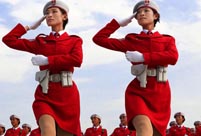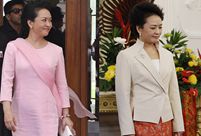 Bikini show in 2014 China Final of Miss Tourism World
Bikini show in 2014 China Final of Miss Tourism World
 Close-up view of August Aerobatic Team
Close-up view of August Aerobatic Team
 Goddesses married in 2014
Goddesses married in 2014
 Polar region photos raise worldwide awareness of global warming
Polar region photos raise worldwide awareness of global warming
 Get off at the last stop — Beijing Subway in vision
Get off at the last stop — Beijing Subway in vision
 Top 100 beauties in the world!
Top 100 beauties in the world!
 Gallery: Who is the most beautiful one?
Gallery: Who is the most beautiful one?
 If you like autumn, put your hands in the air!
If you like autumn, put your hands in the air!
 Fan Bingbing's "Queen style" in new play
Fan Bingbing's "Queen style" in new play
 Lingerie show at 2014 Miss China
Lingerie show at 2014 Miss China
BEIJING, Dec. 12 -- The Dajun think thank established by Zhong Dajun, 62, a well known economic commentator, is hamstrung by its perennial struggle for funds.
The prototype of China's independent think tanks, Dajun has concentrated on independent research in macroeconomics, institutional reform and social development for over 13 years. Today, it struggles to survive in a market dominated by government-backed counterparts, said Zhong.
Without regular funding, Zhong is tired of making ends meet by consultancy work and the reputation of the think tank is diminishing.
Zhong's plight is not unusual among private think tanks, but President Xi Jinping's recent comments have soothed some of the industry's battered confidence.
In late October, Xi called for think tanks to start pulling their weight, improve policymaking and spread soft power. The President is discontented by their inability to adapt to the country's rapid development and lack of global impact. He honed in on "coordinated development" of government and independent think tanks, as the latter remain marginalized.
A blue book on Chinese think tanks published in February 2013 showed 95 percent tied to the government, and many were nothing more than preachers of government policy.
"We're expecting practical supportive measures," said Li Jian, a retired military officer who founded the Knowfar Institute for Strategic and Defense Studies in 2009.
Knowfar managed to feed itself in 2012 by translating public data on foreign militaries for the domestic army and military enterprises, but needs extra money to publish the research findings.
"These academic works can't be bestsellers, so we need subsidies, the privilege of government-backed institutes, " Li said.
Wang Huiyao, author of "Global Think Tanks", believes grassroots think tanks are an indispensable supplement to government bodies.
"A booming marketplace of ideas requires both types of think tanks, in the same way that the market economy can't exclude private enterprises," Wang wrote.
It is not easy for government think tanks to be impartial if the government funds them and determines salaries and promotion. Independent ones are free of administrative intervention in their research. But their very independence is a double-edged sword, leading to chronic financial difficulties and neglect by policymakers.
Non-governmental think tanks in some other countries enjoy diverse donations from foundations, individuals and companies. They do paid services for the government and companies. In China, private cash seldom reaches think tanks.
Just to survive, some have stooped to lobbying for interest groups, such as real estate developers, according to Yu Jin, editor-in-chief of the quarterly magazine China Think Tank.
In addition, they are often shunned by policy advisory programs since officials often prefer theoretical support to opposing argument, Wang said.
The organizations are in dire need of more freedom, as well as support from the government and the public, and full access to pubic data, he says.
Peng Peng with the Guangzhou Academy of Social Sciences proposed that private think tanks should be able to bid for government programs and be offered tax breaks.
Despite the heavy financial burden, Zhong Dajun has decided to scrap his business consultancy, the major source of his funds, saying he is "too old" to be distracted by business matters.
The maverick scholar pins his hopes on private donations, but has no idea when, or from where, they will come.
 20 years on: Relocated Three Gorges residents through lens
20 years on: Relocated Three Gorges residents through lens PLA HK Garrison veterans leave behind beautiful smiles
PLA HK Garrison veterans leave behind beautiful smiles Representative beauties of each province in China
Representative beauties of each province in China Chestnut girl goes viral online
Chestnut girl goes viral online Victoria's Secret Fashion Show
Victoria's Secret Fashion Show In photos: Bright and brave female soldier of PLA
In photos: Bright and brave female soldier of PLA China's charming first lady
China's charming first lady Excellent photos of Zhuhai Air Show
Excellent photos of Zhuhai Air Show China's heavyweight aircraft
China's heavyweight aircraft Society needs consensus on street politics
Society needs consensus on street politics Policy bank plan gets mixed reaction
Policy bank plan gets mixed reaction  Shopaholics
Shopaholics  Hungry moments
Hungry momentsDay|Week|Month